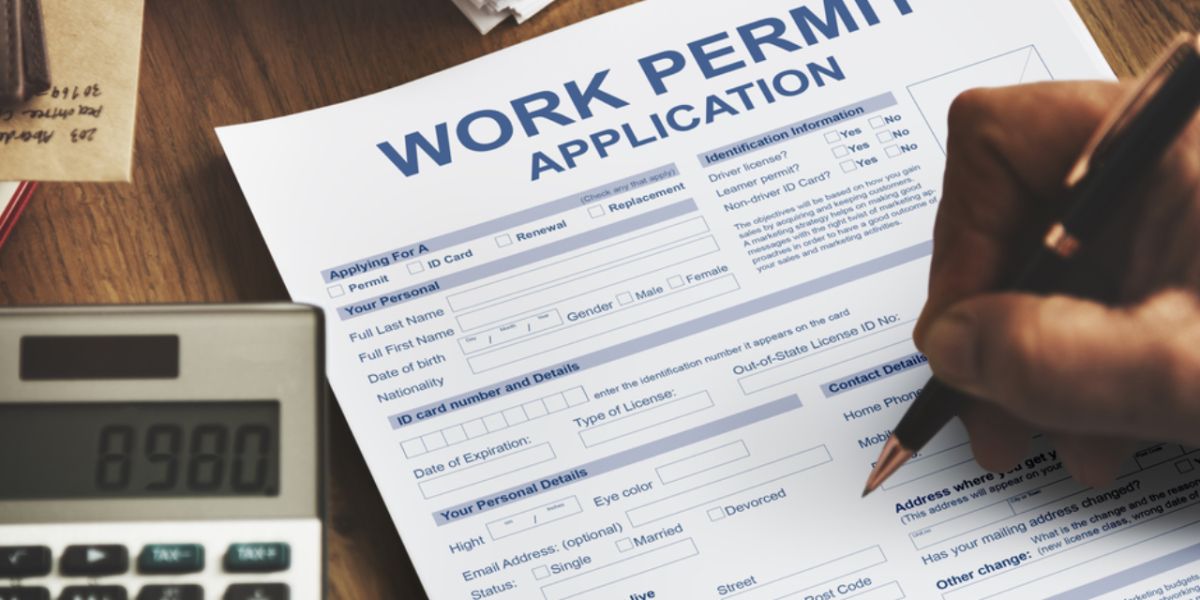
To be able to work in Thailand and stay in the country without needing to apply for visa extensions regularly, you will first need to obtain a Non-Immigrant Business Visa, followed by a work permit. There are strict penalties, including fines or imprisonment, for foreigners who take up employment without a work permit, so don't be tempted to go down this route.

So, if you do plan to explore work opportunities in Thailand, it's essential that you do things legally and obtain a work permit. Below, we explore your options for doing just that.
Work visa in Thailand: the basics
Let's start with some general information.
First, while there definitely are work opportunities available in Thailand, there are also a number of limitations. For instance, foreigners in Thailand are prohibited from certain occupations, according to the Ministry of Labour (MOL). These include:
- traditional occupations and manual labor (Thai massage, sightseeing tour operation, handmaking silk products, shoemaking, clothes weaving, etc.);
- certain types of legal work;
- civil engineering and architectural work (with some exceptions);
- agriculture;
- office or secretarial work.
It is also important to keep in mind that the criteria and procedures for the application for a Thai work permit are frequently modified. This is why it is highly advised to regularly check the Ministry of Labor's website for updates.
Before getting a work visa in Thailand, it is advisable to apply for a Non-Immigrant Business Visa at the Royal Thai Embassy or Royal Thai Consulate-General in your home country or your country of residence before you move to Thailand. However, some investors or experts are able to go directly to the One Stop Service Centre for Visas and Work Permits in Bangkok, which was established in 1997 with the objective of facilitating applications for visa extensions and permits in Thailand. It is advisable to contact your nearest Royal Thai Embassy or Consulate-General to find out where you should apply for your visa and when.
Popular jobs for expats in Thailand
While there are indeed limitations to what expats can do in Thailand in terms of work, there are also a number of specific areas where foreign expertise is in high demand. Here are a few of them:
- Teaching: This is one of the most popular occupations for expats in Thailand and a great way to jump-start your career, organize a gap year, or explore a change of profession. Teaching opportunities are generally widely available in Thailand, both in the public and private sectors. English teaching is a particularly popular option, with lots of training centers and language schools offering contracts to expats, even those with little teaching experience. For most positions, however, you will be asked to present a TEFL certificate and at least a bachelor's degree in a related subject. You can also consider private lessons on the side in addition to your main job. While you most probably won't make a fortune while teaching in Thailand, it can be a solid first step in establishing yourself in the country, managing daily expenses, and more;
- Marketing: Many local and international companies in Thailand work with Western companies and benefit from having foreign talent employed. Large companies like Grab, DeeMoney, Agoda, and others all have foreign staff and offer rather lucrative and long-term career options for expat professionals;
- Real estate: The real estate market in Thailand went through some tough times during the COVID-19 pandemic — but as an overseas investment in returning to the country, so are job opportunities in this industry. Real estate agencies like CBRE, Colliers International, and others all employ foreign agents to manage local and international projects;
- Diving, fitness, adventure travel, etc.: Many expats in Thailand find themselves offering services to other tourists as well as locals. Diving and other adventure activities are very popular in the country and offer lots of work opportunities for interested individuals. From helping visitors explore Thailand's underwater world to teaching yoga at one of the many resorts, these may be exciting careers to consider;
- Freelance and remote work: Thailand is one of the most popular destinations for digital nomads. These lucky location-independent individuals use modern technology to work from anywhere in the world. Thanks to the country's low cost of living, relatively relaxed visa policies, and friendly expat community, freelancers and others working remotely often set up their bases in the country. If you are employed in another country, you won't need to apply for a work visa in Thailand and will have the freedom to explore other visa opportunities.
Non-Immigrant Visas in Thailand
Different types of non-immigrant visas are available depending on your intentions in Thailand. Whether you want to work, study, perform missionary work, conduct research, stay with family, or retire, there is a specific type of non-immigrant visa for which you need to apply.
However, there are four main categories of non-immigrant visas suitable for those wishing to work or invest in Thailand, and applicants can only be granted a work permit from the Department of Employment once they have been issued their non-immigrant Visa. You will need to apply for the relevant visa at your nearest Royal Thai Embassy or Royal Thai Consulate-General, and a multiple-entry visa with one-year validity will cost the equivalent of THB 5,000.
Non-immigrant visa category B (Business Visa)
This type of visa is issued to applicants who wish to either work permanently in Thailand or conduct business in the country for up to 90 days. Suppose it is a question of a permanent position. In that case, the applicant's prospective employer in Thailand needs to submit documents that include all the hiring company's data along with the forms provided by Immigration. The requirements are readily available on the Thai Immigration website. Take note that each immigration location varies from time to time according to the requirements needed.
Non-immigrant visa category B-A (Business Approved Visa)
The company in which the applicant will invest or with which they will conduct business may apply for this type of visa on behalf of the applicant. Once the application is approved, the Immigration Bureau will advise the concerned Royal Thai Embassy or Royal Consulate-General via the Ministry of Foreign Affairs to issue the visa to the applicant. The holder of this category "B-A" visa will be permitted to stay for a period of one year from the date of first entry.
Non-immigrant visa category IB (Investment and Business Visa)
This type of visa is issued to foreign citizens who will be employed on investment projects approved by the Board of Investment of Thailand (BOI). Such projects must benefit Thailand by promoting exports, increasing employment, utilizing local raw materials, encouraging technology transfer to Thai nationals, or engaging the provinces. They must also not hinder existing domestic businesses.
Non-immigrant visa category B (Teaching)
This visa is issued to foreigners who intend to work as school teachers in Thailand. They must have the necessary qualifications, a clear criminal record, and a letter of employment from an institute or school in Thailand, as well as a letter of approval from government agencies, such as the Office of the Private Education Commission and the Office of the Basic Education Commission.
How to obtain a work visa in Thailand
The requirements for obtaining a work visa in Thailand vary depending on the type of Non-Immigrant Visa you are applying for.
Work permit in Thailand
Once you have obtained a Non-Immigrant Visa Category B, you will then need to obtain a work permit. You can apply for a work permit at the Thai Labour Department in the area where your company is located. You will need to pick up your blue work permit book in person at the Labour Department and sign it in front of the staff. The Labour Department will put a stamp at the back of your passport at the time of receipt, and the permit will be valid for as long as your visa is valid. Sometimes, the expiration date of the work permit might not be the same as the expiration date of the visa. This won't be an issue. Just make sure that the visa is always up to date, or else you will be paying a fine of THB500 per day. Take note that the visa is more important than the Work Permit itself.
Companies in Thailand can be granted a maximum of 10 work permits so long as they hire four full-time Thai staff members for every foreign employee. Exceptions are made if the company is promoted by the country's Board of Investment, which is authorized to grant special rights regarding the issuance of work permits and visas for foreign employees.
Thai companies that wish to employ foreigners must have at least THB2 million in fully paid registered capital. Foreign companies, on the other hand, can hire foreigners if they pay at least THB3 million baht for every foreign employee.
To apply for a work permit, in most cases, you (the employee) will need the following documents:
- Signed copies of every used page of your passport;
- Non-Immigrant Business Visa;
- Education degree and transcript;
- Any relevant certificates or licenses;
- CV or resume (describing your previously held positions, responsibilities, and length of employment);
- Three 5cm×6cm photos with your full face shown. Some jurisdictions also have dress code requirements for the photo, such as wearing a suit and tie. These photos must have been taken within 6 months before you apply for the Thai work permit;
- Marriage certificate (if married to a Thai national).
Once you've been granted a work permit, you can work for the company that you detailed on your application. You can also work for other companies as long as you list them on your work permit. If you change employers, you will need to apply for a new work permit. Once you have your work permit, you will also be required to obtain a Tax Identification Card from your employer, which will have your Tax Identification Number (TIN).
Once the visa and work permit are completed, you need to appear at the respective immigration office to which you have applied. Foreigners are required to report to immigration police every 90 days. You can also do this process online or through the Thai Post. Those holding a multiple-entry visa will need to depart Thailand and renew their extension of stay after each 90-day entry.
Useful links:
We do our best to provide accurate and up to date information. However, if you have noticed any inaccuracies in this article, please let us know in the comments section below.








